Other stones
77 Products
-
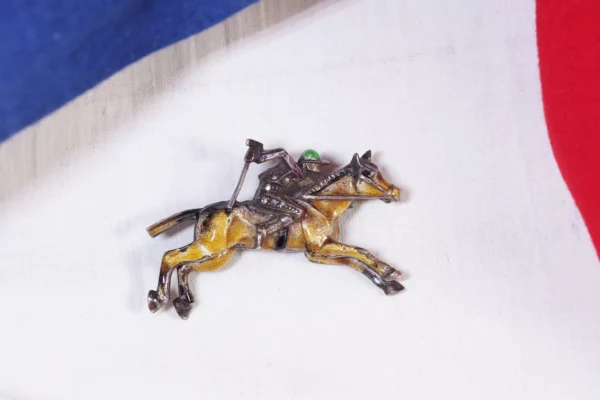
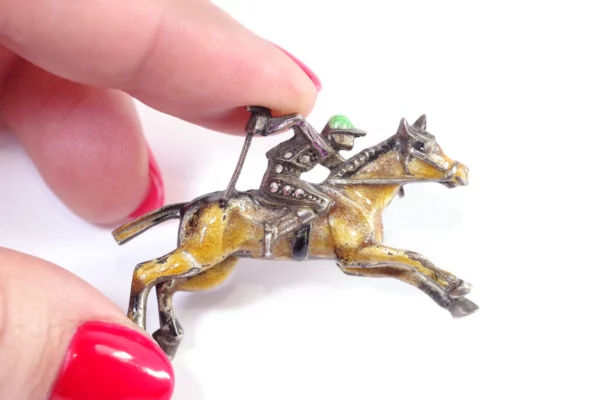 160,00€
160,00€Art Deco jockey brooch in 935 silver. This antique sports brooch features a jockey and his horse in the midst of a horse race. The jockey’s jacket and pants are set with marcasites. His cap is enameled green, and the horse’s coat is enameled brown (isabelline color). Antique brooch, Edwardian Art Deco period, early 20th century. Sport jewelry collection.
Poinçon 935 and illegible maker’s mark
Dimensions: 2.5 x 4.3 cm
Note: the clasp is secure
Condition: some enamel loss, signs of wearWeight: 8.46 gr
More information : Equestrianism has been included in the Olympic program since the 1900 Paris edition, with three jumping events. Since 1912, this sport has always been present at the Olympic Games.
-
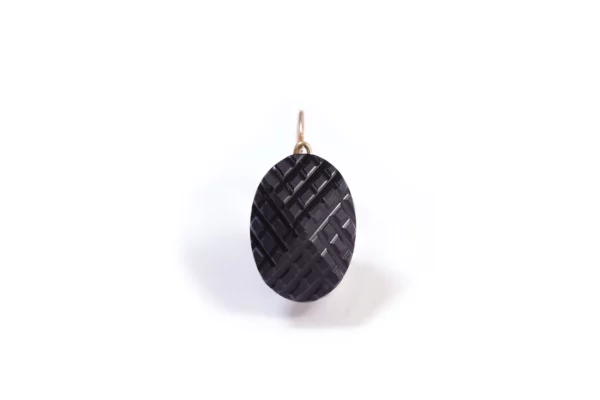
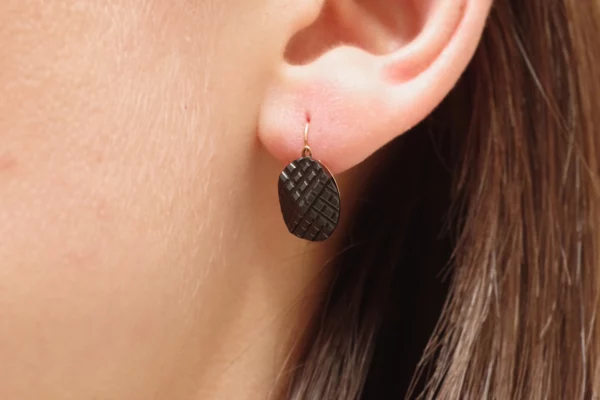 140,00€
140,00€Single black dormeuse earring in 18 karat rose gold (750/1000). Unique dormeuse earring decorated with black glass imitating jet, known as “verre de Paris.” The glass is pointed and decorated with a grid pattern. Antique single earring, circa 1830, France. Unmatched piece.
Hallmark: ram’s head (1819-1838, french state hallmark for 18 karat gold)
Height: 18 mm
Width: 9 mmCondition: wear and tear. This earring is sold individually.
Weight: 1.31 gr
-
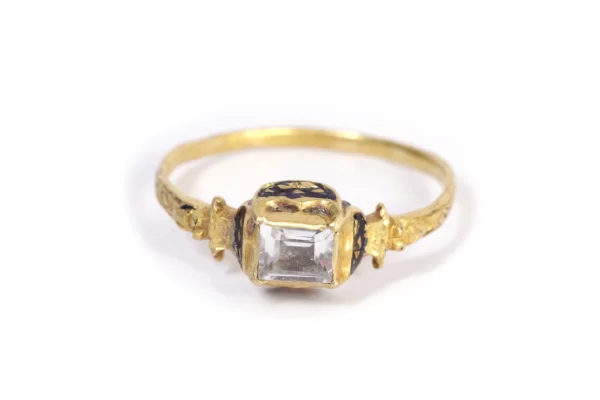
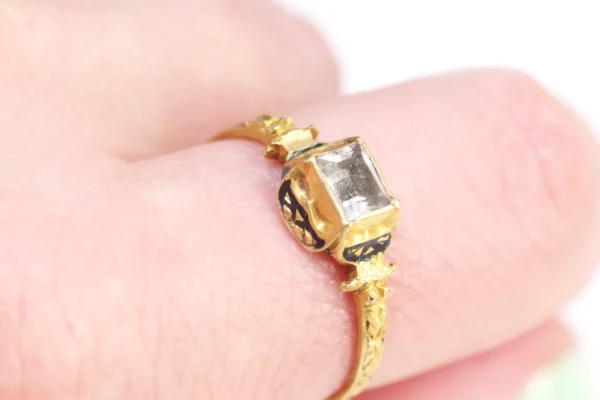 Out of Stock
1,00€
Out of Stock
1,00€Scarce rock crystal Renaissance ring in 22 Karat gold. This 16th-century ring is setted with a table-cut rock crystal in a closed setting. The bezel is decorated with black enamel with gold highlights and double crescent motifs, ending in four prongs. The shoulders feature fine chiseling. Renaissance ring from the 16th century, Western Europe. During the Renaissance, rings evolved from the simple forms of the medieval period to miniature works of art, combining the skills of the chiseler, engraver, enameler, and stone cutter. Cabochon settings persisted, but the evolution of stone cutting allowed for the increased use of table cuts.
Ring size: 57 EU or 8 US
Bezel dimensions: 7 x 8 mm
Estimated weight of the rock crystal: 0.49 ct
Note: For examples of similar 16th-century rings, see items 334 and 430 in Scarisbrick’s “Rings; Jewellery of Power, Love and Loyalty” (2007); item AF.1743 in the British Museum collection and items 279 and 281 in the “Victoria and Albert Museum Catalogue of Rings” by Oman (1930).
Condition: normal wear consistent with age, a missing part in the setting.
Weight: 2.91 gr
-
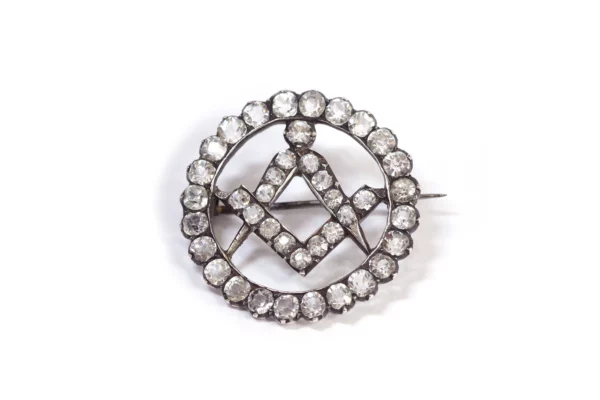
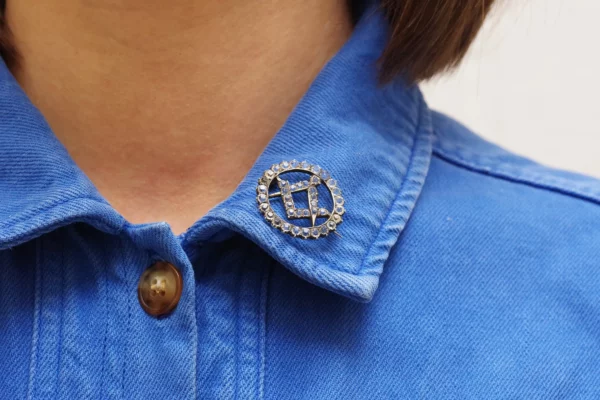 450,00€
450,00€Antique Masonic brooch in silver. Masonic brooch featuring the Square and Compasses within a circle, set with rhinestones. The combination of the Square and Compasses forms a square within the circle, symbolizing matter surrounded by the spiritual. The reunion of body and spirit can be supported by the quest for the squaring of the circle. In Masonic believes, the Compass symbolizes spiritual measurement and the individual’s ability to keep their actions within the bounds of what is right and appropriate. It also represents the capacity for self-assessment and improvement. The Square, on the other hand, represents the virtue of living a straight and balanced life, while respecting moral and ethical laws. Antique brooch, circa 1900.
Swan hallmark (french state hallmark for silver)
Diameter: 26 mm
Condition: signs of wear
Weight: 3.76 gr
*The antique gold chain is not sold with the jewel*
-
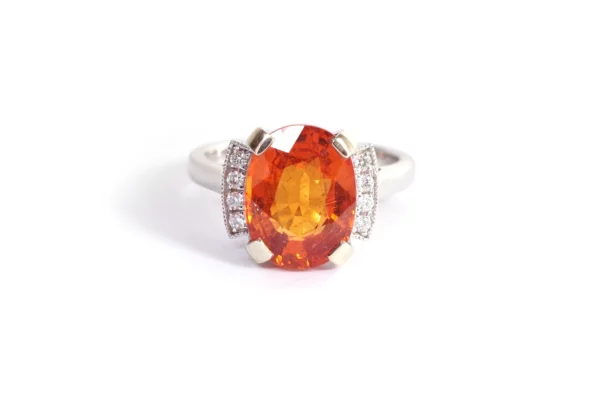
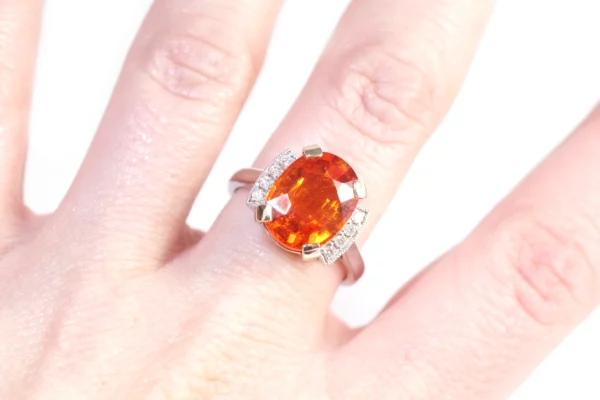 3200,00€
3200,00€Mandarin garnet ring in white gold 18 karats (750). The ring is centered with an oval mandarin garnet (also called spessartite), with an intense orange color. The garnet weighs approximately 6.84 carats. The garnet is set with four prongs and flanked by eight brilliant-cut diamonds. Vintage ring, circa 2000, United Kingdom.
Hallmarks: 750 AU, XM, and other English hallmarks.
Ring size: 53 EU or 6.25 US (resizable)
Dimensions of the ring head: 13 x 14 mm
Dimensions of the mandarin garnet: 12.42 mm x 9.55 mmEstimated weight of the mandarin garnet: 6.84 cts
Estimated weight of the diamonds: 0.12 ctCondition: light signs of wear
Weight: 6.90 gr
*The antique box is not sold with the jewel*
-
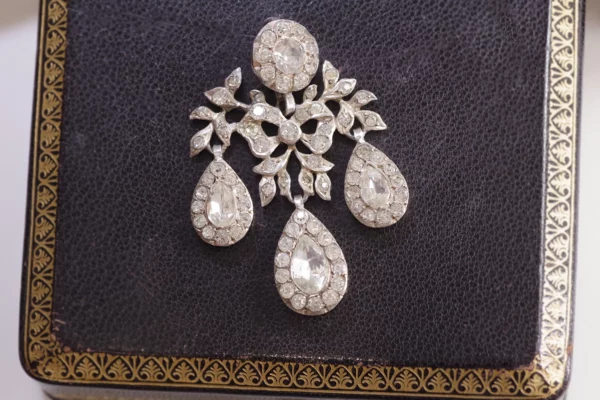
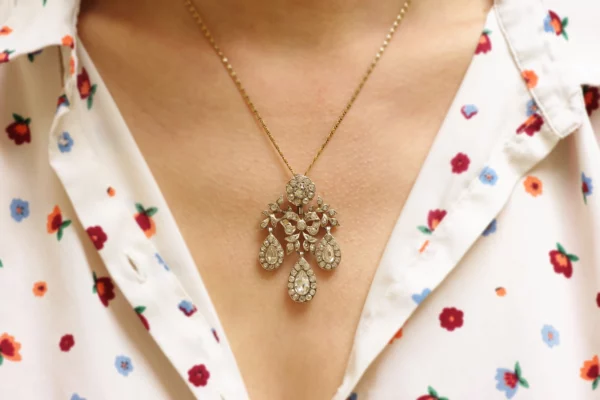 700,00€
700,00€Victorian silver girandole pendant in silver 800. A girandole pendant forming a large knot holding three drops in the style of late 18th-century jewelry. The entire piece is set with white paste stones on foils. Victorian period, circa 1860-1880, France.
Boar hallmarks (french state hallmark for silver)
Height (with setting): 50 mm
Width: 33 mmCondition: fine wear scratches
Weight : 11.31 gr
*The antique box and the chain are not sold with the jewel*
See our antique chains -
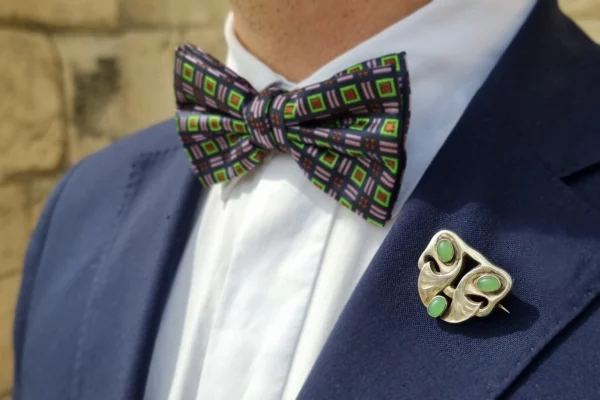
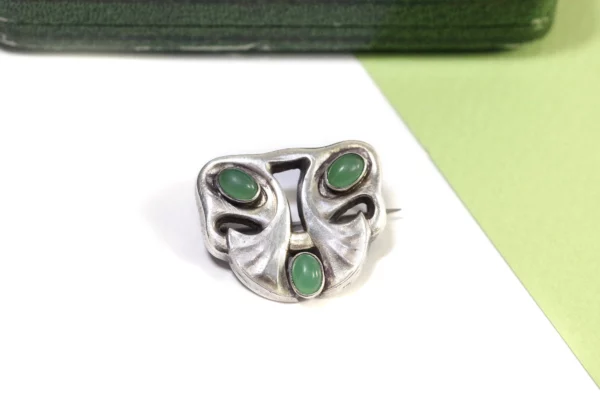 490,00€
490,00€Jugendstil silver brooch. Brooch in silver set with light green glass cabochons. Art Nouveau brooch, Jugendstil period, circa 1900, School of Pforzheim, Germany.
Registered hallmark and weevil hallmark.
Dimensions: 30 x 25 mm
Condition: scratches from use
Weight : 7.34 gr
*The antique box is not sold with the jewel*
Learn more: The city of Pforzheim specializes in the creation of Jugendstil jewelry (Art Nouveau movement in Germany), drawing inspiration from French jewelry, most often crafted in silver and set with cabochon semi-precious stones. These jewels were more accessible than the precious material jewelry of the French Art Nouveau period. Theodor Fahrner, Georg Kleemann, and the firm Carl Hermann & Speck are the most significant creators of this movement in Germany.
-
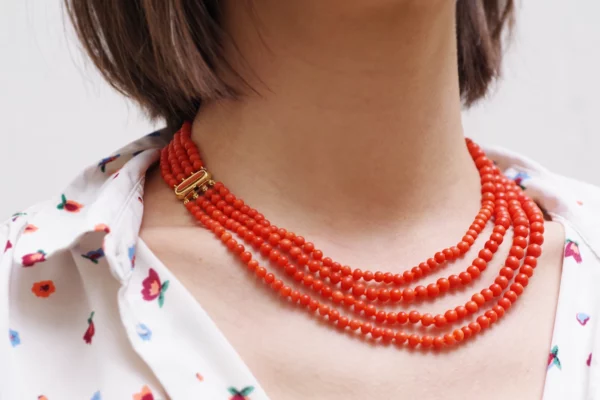
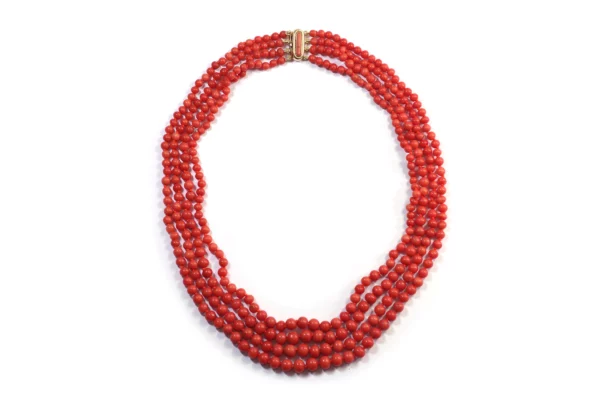 1800,00€
1800,00€Four rows coral beads necklace with a clasp in 18 karat gold. Antique necklace with four rows of coral beads from small to large pearls. The color of pearls is orange with shades of light to dark orange. The necklace closes with a large ratchet box clasp set with an elongated coral cabochon. Necklace circa 1940. Owl hallmark.
Length: 43 cm
Note: the necklace has been entirely threaded with new silk threads.
Weight : 61.66 gr
Gemological point: Coral is a gem of organic origin. Only the branched calcareous trunks of certain corals are used in jewellery. Its colour is due to organic pigments close to carotene: varying from blood red to white, passing by the pink “angel skin”. Currently, most coral species are protected under CITES, the Convention on International Trade in Endangered Species of Wild Fauna and Flora.
-
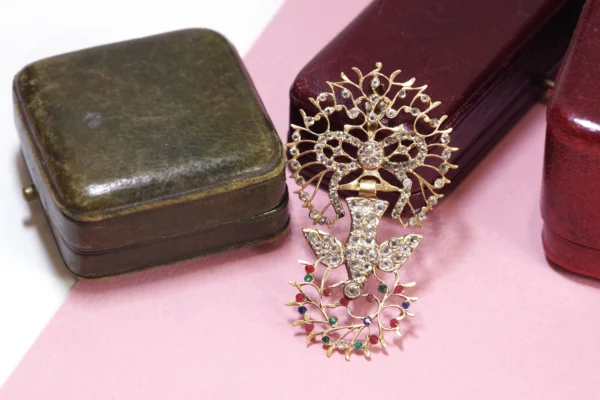
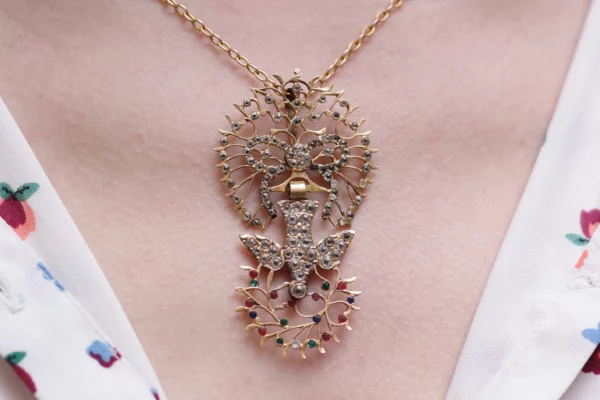 1500,00€
1500,00€Gold Normandy Saint Esprit pendant in 18 karat gold. Originally from Normandy, it features a dove with its head down, holding an olive branch in its beak. The bird hangs from a bow richly decorated with white paste stones, imitating diamonds. Red and green faceted glass adorns the olive branch at the bottom. A flat ring on the reverse of the pendant allows it to be worn on a velvet chain or ribbon. Norman regional catholic pendant, France, circa 1850.
Horse hallmark (1838-1919), regional trumpet hallmark and partially erased goldsmith’s hallmark.
Height: 6.5 cm
Width: 3.7 cmCondition: minor wear
Weight : 8.60 gr
*The antique box and the chain are not sold with the jewel*
See our antique chains -
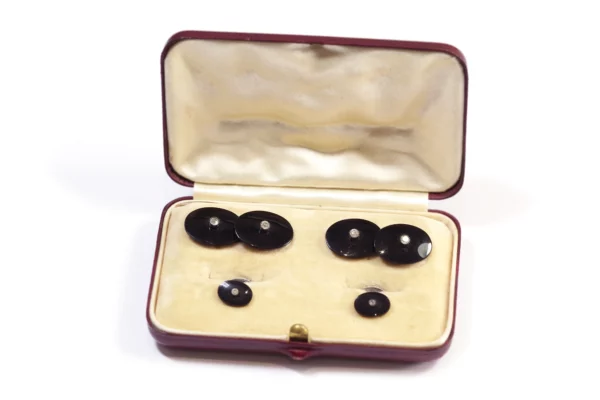
 200,00€
200,00€Art Deco onyx cufflinks in silver. Pairs of onyx cufflinks, oval-shaped, decorated with a paste stone imitating diamond in the center. Mounted on silver, they are matched by two collar buttons. The set is sold in its original leather case. Pair of cufflinks, early 20th century, Art Deco, France.
Boar hallmark and illegible goldsmith’s hallmark.
Cufflink dimensions: 15 x 11 mm
Dimensions of collar buttons: 9 x 6 mmNote : sold in the original box
Condition: oxidized, small missing part behind one of the cufflinksCufflinks weight: 4.22 gr
Collar buttons weight : 1.52 gr -
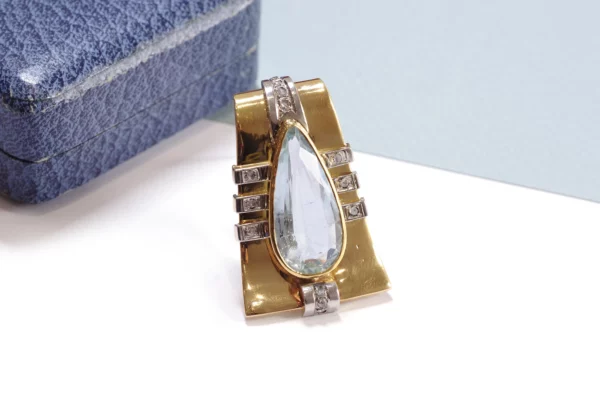
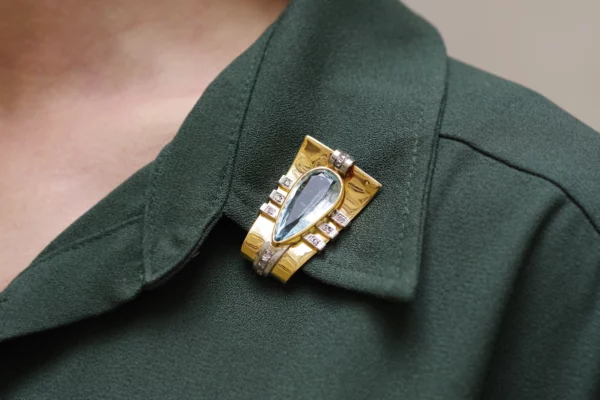 3000,00€
3000,00€Aquamarine clip brooch in 18 karat yellow gold and platinum. Retro period lapel clip in the form of a trapezoid ribbon, centered on a large pear-cut aquamarine weighing approx. 7.17 carats. The clip is decorated with platinum bands set with 13 rose-cut diamonds. Retro period lapel clip, circa 1940.
Owl and mascaron hallmarks (french state hallmark for 18 karat gold and platinum)
Dimensions: 41 mm x 26 mm
Aquamarine dimensions: 26.4 x 12 x 6.10 mm
Estimated aquamarine weight: 7.17 carats
Estimated diamond weight: 0.13 caratCondition: lightly scratched, oxidized
Weight : 15.84 gr
-
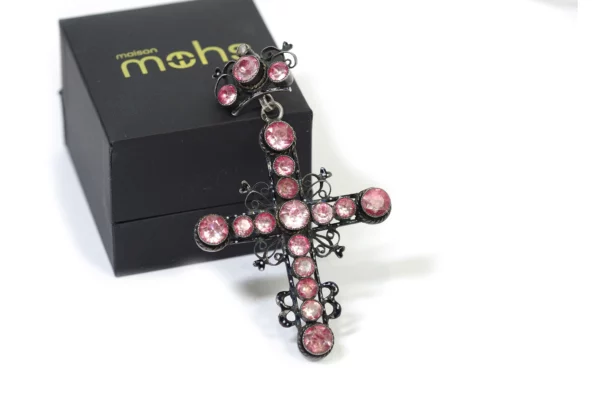
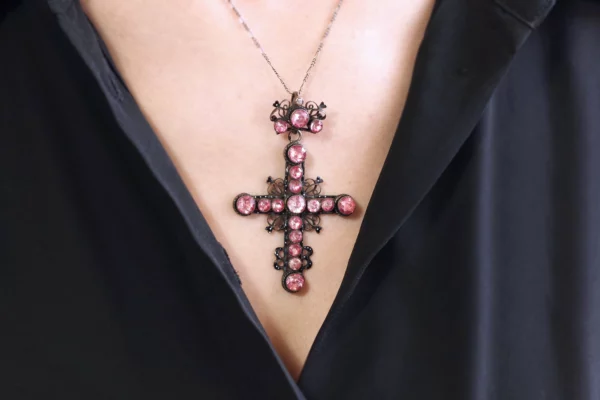 480,00€
480,00€Victorian French enamel foiled paste cross pendant in silver. This cross is in silver with filigree decoration, forming a cross adorn with paste faceted pink glasses on spangles meant to have a look of pink topaz. A black enamel decoration with white dots covers the entire pendant. A glass bead adorns the upper part of the composition. The bezels are completely closed. French work from the beginning of the 19th century
French work from the middle of the 19th century
Wild boar hallmark
Width: 4.3 cmCondition: lack of enamel, cracks.
Weight: 13.37 g
*The antique gold chain is not sold with the jewel*
See our antique chains
